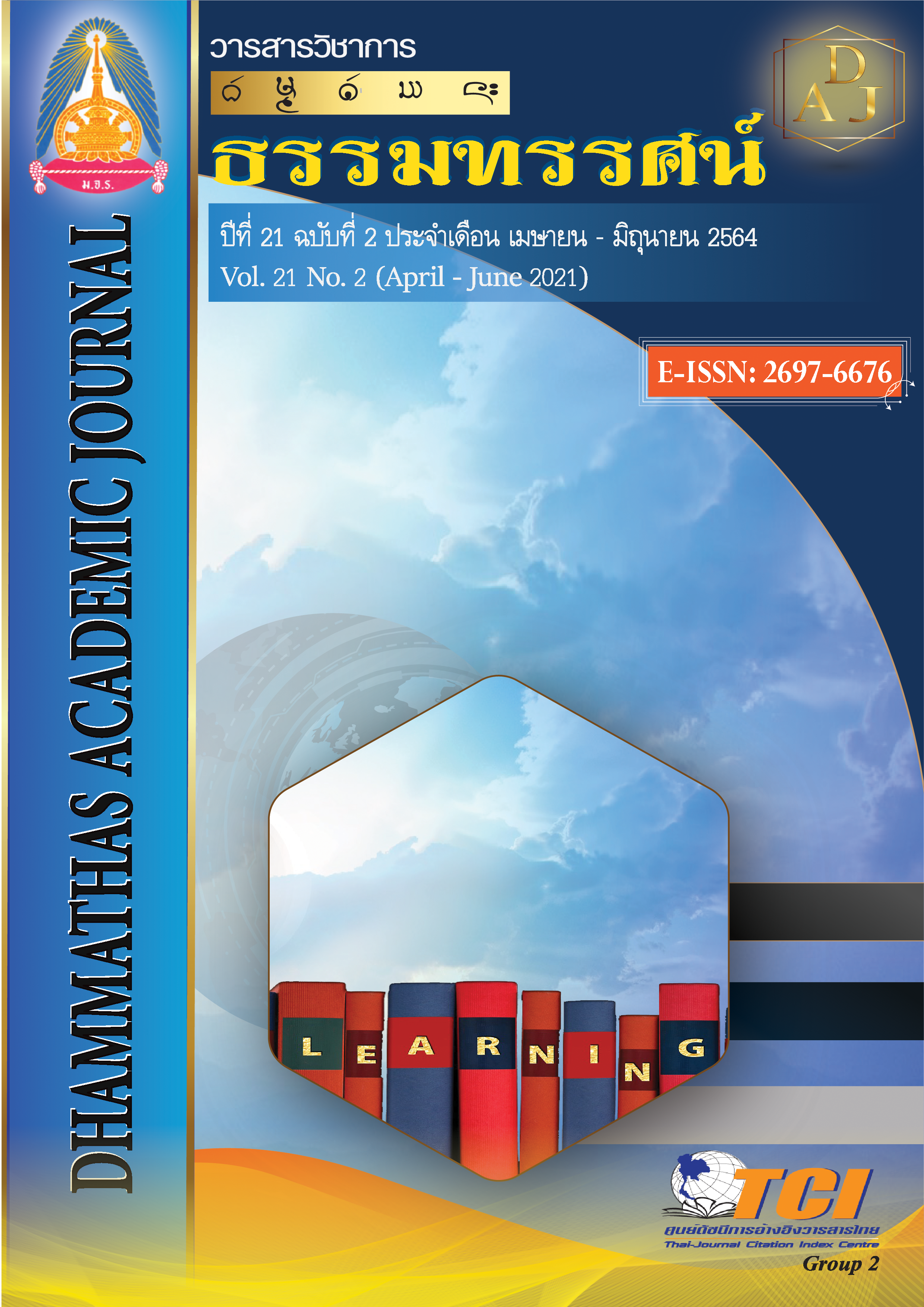A Study of Massive Open Online Courses (Moocs) Learning Strategies of Generation Y Workers in Bangkok
Main Article Content
Abstract
The objectives of this research were to study learning data through Massive Open Online Course (MOOCs) of Generation Y people in Bangkok and to study problems and obstacles of learning through Massive Open Online Course (MOOCs) of Generation Y people in Bangkok. The samples consisted of 335 Generation Y workers in Bangkok who were born between 1981 and 1999. They have acquired learning or training experience through service provider MOOCs in Thailand. This mixed methods survey research used both quantitative and qualitative research. Data were collected through 355 questionnaires. The statistics used to analyze the data were percentage, frequency, average and standard deviation. Subsequently, the information was obtained through interviews. This study was selected from 12 purposive sampling respondents. The data were then analyzed using content analyses and inductive analyses.
Results from the study indicated that:
1. Most samples had a specialized learning style for reading and writing. They often used computers to learn MOOCs from home. Most of them enrolled in a free course and took approximately 15-30 minutes of sessions. Language courses were popular for registration and obtaining a certificate of completion.
2. Access to technology systems, a lack of digital literacy, an unintuitive Learning Management System design, and a curriculum that is unsuitable for millennial behavior were the primary barriers to learning through MOOCs.
Article Details
References
กระทรวงการอุดมศึกษา วิทยาศาสตร์ วิจัยและนวัตกรรม. (2562). อว. ร่วมเสริมพลัง: เพิ่มองค์ความรู้: ต่อยอดการจัดการเรียนรู้ออนไลน์กับ THAI MOOC. เข้าถึงได้จาก https://www.mhesi.go.th/home/index.php/pr/news/344-thai-mooc
กองบริหารงานวิจัยและประกันคุณภาพการศึกษา. (2559). พิมพ์เขียว Thailand 4.0 โมเดลขับเคลื่อนประเทศไทยสู่ความมั่งคั่ง มั่นคง และยั่งยืน. เข้าถึงได้จาก http://www.libarts.up.ac.th/v2/img/Thailand-4.0.pdf
โครงการมหาวิทยาลัยไซเบอร์ไทย. (2561). ความเป็นมา Thai MOOC. เข้าถึงได้จาก http://mooc.thaicyberu.go.th/about-us/
ถนอมรัตน์ ฟองเลา. (2562). Digital badge ประกาศนียบัตรโลกออนไลน์. เข้าถึงได้จาก http://www.pmat.or.th/ความรู้ทรัพยากรบุคคล/1712/รู้หรือไม่%20(how%20to)/20700/gallery2 /?contentid=37980
บริษัท กสท โทรคมนาคม จำกัด (มหาชน). (2563). CAT ร่วมกับ Google ติดตั้ง Google Station-CAT WiFi ฟรีอินเทอร์เน็ตไร้สายความเร็วสูงที่มีคุณภาพ ทั้งในพื้นที่กรุงเทพฯ ปริมณฑล และส่วนภูมิภาค. เข้าถึงได้จาก https://www.cattelecom.com/cat/content/3283/216/CAT
เวิร์คพอยท์ ทูเดย์. (2561). รู้จัก MOOC มหาวิทยาลัยออนไลน์ เรียนได้ทั่วโลก. เข้าถึงได้จาก https://workpointtoday.com/เจาะตลาด-mooc-มหาวิทยาลัย/
ศูนย์ดำเนินงาน PISA แห่งชาติ สถาบันส่งเสริมการสอนวิทยาศาสตร์และเทคโนโลยี. (2563). โรงเรียนและนักเรียนมีความพร้อมเพียงใดกับการเรียนการสอนผ่านระบบออนไลน์: ข้อค้นพบจาก PISA. เข้าถึงได้จาก https://pisathailand.ipst.ac.th/issue-2020-51/
สำนักงานอุทยานการเรียนรู้. (2560). Thai MOOC ก้าวสำคัญของการศึกษาเพื่อคนทุกคน. เข้าถึงได้จาก https://www.tkpark.or.th/tha/articles_detail/332/Thai-MOOCก้าวสำคัญของการศึกษาเพื่อคนทุกคน
Analía Cicchinelli, Eduardo Veas, Abelardo Pardo, Viktoria Pammer-Schindler, Angela Fessl, Carla Barreiros, & Stefanie Lindstädt. (2018). Finding traces of self-regulated learning in activity streams. Paper presented at the Proceedings of the 8th International Conference on Learning Analytics and Knowledge, Sydney, New South Wales, Australia. Retrieved from https://doi.org/10.1145/3170358.3170381
Christensen, L., Gittleson, J., & Smith, M. (2020). The most fundamental skill: Intentional learning and the career advantage. Retrieved from https://www.mckinsey.com/featured-insights/future-of-work/the-most-fundamental-skill-intentional-learning-and-the-career-advantage#
Gallo, C. (2014). The Science Behind TED's 18-Minute Rule. Retrieved from https://www.linkedin.com/pulse/20140313205730-5711504-the-science-behind-ted-s-18-minute-rule/
Hana, A., & Asadullah, S. (2019, 28-30 June 2019). Digital Literacy and the Attitude of Educators Towards MOOC Platform in GCC Countries. Paper presented at the 2019 IEEE International Conference on Innovative Research and Development (ICIRD).
Hone, K. S., & El Said, G. R. (2016). Exploring the factors affecting MOOC retention: A
survey study. Computers & Education, 98, 157-168.
Jisc. (2016). Technology and tools for online learning. Retrieved from https://www.jisc.ac.uk/full-guide/technology-and-tools-for-online-learning
Kiers, J., & Werff, J. (2019). The Future of Work requires a Future of Professional Learning: From stand-alone, academic MOOCs to Programmes that are relevant for Professionals.
Knott, R. (2020). Video Length: How Long Should Instructional Videos Be? (New Data). Retrieved from https://www.techsmith.com/blog/video-length/
LinkedIn. (2020). What is LinkedIn and How Can I Use It?. Retrieved from https://www.linkedin.com/help/linkedin/answer/111684/linkedin-?lang=en
Liu, L. (2017). An Empirical Analysis of Chinese College Learners' Obstacles to MOOC Learning in an English Context. English Language Teaching, 10(3), 136-150.
Lynch, L. (2019). How Long Should Videos Be for E-Learning?. Retrieved from https://www.learndash.com/how-long-should-videos-be-for-e-learning/
Ma, L., & Lee, C. S. (2020). Drivers and barriers to MOOC adoption: perspectives from adopters and non-adopters. Online Information Review, 44(3), 671-684. doi:10.1108/OIR-06-2019-0203
Mariana, J. (2017). How the different Generations use Media differently. Retrieved from https://www.engarde.net/media-usage-generation-x-y-z/
McAuley, A., Stewart, B., Siemens, G., & Cormier, D. (2010). The MOOC model for digital practice. Charlottetown, Canada: University of Prince Edward Island.
Milligan, C., & Littlejohn, A. (2017). Why study on a MOOC? The motives of students and professionals. The International Review of Research in Open and Distributed Learning, 18(2), 92-102.
Moe, R. (2016). The phenomenal MOOC. In Emergence and Innovation in Digital Learning: Foundations and Applications. Canada: AU Press, Athabasca University.
OECD. (2020). Learning remotely when schools close: How well are students and schools prepared? Insights from PISA. Retrieved from https://www.oecd.org/coronavirus/policy-responses/learning-remotely-when-schools-close-how-well-are-students-and-schools-prepared-insights-from-pisa-3bfda1f7/
Playdon, J. (2016). Why Everyone Should Invest In Language Skills. Retrieved from https://www.topuniversities.com/student-info/daily-news026/why-everyone-should-invest-language-skills
Sandeen, C. (2013). Assessment's Place in the New MOOC World. Research & practice in assessment, 8, 5-12.
Schunk, D. H., & Zimmerman, B. J. (1998). Self-regulated learning: From teaching to self-reflective practice. Guilford Press.
Wang, Y., & Baker, R. (2015). Content or platform: Why do students complete MOOCs. MERLOT Journal of Online Learning and Teaching, 11(1), 17-30.
Wong, J. (2017). Enhancing Self-Regulated Learning in Massive Open Online Courses.
Retrieved from https://www.educationandlearning.nl/projects/enhancing-self-regulated-learning-in-massive-open-online-courses
Yuan, L., Powell, S., & Olivier, B. (2014). Beyond MOOCs: Sustainable online learning in institutions. United Kingdom: University of Bolton, Centre for Educational Technology, Interoperability and Standards.

